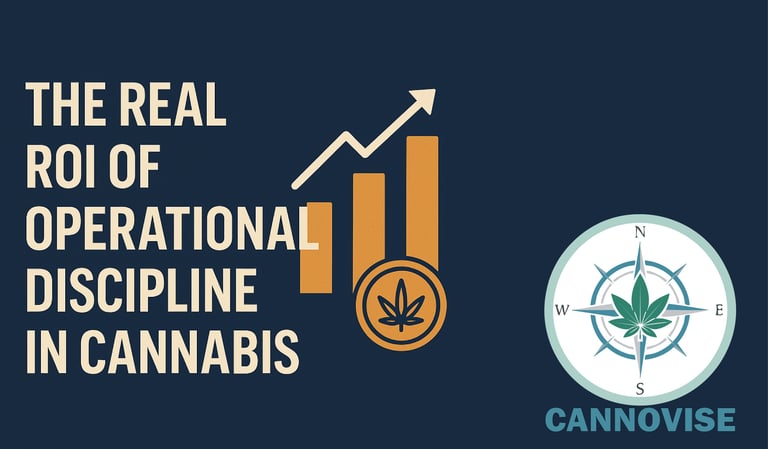The Real ROI of Operational Discipline in Cannabis
William Kanistras
7/31/20253 min read


In cannabis, most people talk about growth. Bigger canopy. Bigger yields. Bigger brands. But the operators who are still standing right now aren’t the ones who scaled the fastest. They’re the ones who ran the tightest ships. Operational discipline isn’t flashy or sexy, but it pays, and in this market, it pays more than ever.
I’ve seen firsthand how tightening up day-to-day systems can turn a bleeding facility into a profitable one. Not with expensive new tech or fancy new hires, but by doing the simple things right, consistently. This isn’t about checklists or SOP binders collecting dust on a shelf. It’s about using operational discipline to create real, measurable ROI that shows up on your bottom line.
What Operational Discipline Means
It’s not about being perfect. It’s about being consistent. Operational discipline means that you have systems in place and your team is trained and supported to follow them. Daily checklists get used. Tasks don’t get skipped. When one team finishes its work, it flows smoothly to the next. When something breaks, you troubleshoot and develop a strategy to prevent it from happening again.
Most importantly, it means your operation can deliver the same quality consistently, even when the original team isn’t in the room. That’s the kind of reliability that turns customers into repeat buyers and regulators into allies.
Where the ROI Comes From
When operators evaluate revenue, the emphasis is often placed on sales volume or customer acquisition. True financial performance is driven by recognizing, capturing, and improving margins. Effective operational discipline directly contributes to margin enhancement by reducing waste, optimizing processes, and improving overall efficiency.
Here’s how:
Waste and Rework
Every mistake costs money. Whether it’s under-dried flower, sloppy trim, mislabeled products, or failed compliance tests, those losses add up. I’ve walked into facilities where teams were spending 20 hours a week fixing preventable issues. That’s thousands of dollars lost in wasted labor, materials, and missed opportunities every month.
Quality and Yield
When SOPs are followed, plants respond. Pest pressure drops. Variability decreases. Yield improves. I’ve seen yield boosts of 10 to 15 percent just by tightening nutrient schedules, environmental controls, and ipm routines.
Employee Retention and Training
Employees don’t quit because the work is hard. They quit because it’s chaotic. Disciplined systems reduce confusion, speed up onboarding, and help people feel confident.
Compliance and Audit Readiness
Regulators don’t want a show. They want to see consistency, documentation, and accountability. When your operations are dialed in, inspections become routine, non-disruptive events.
Scalability
You can’t expand what you can’t repeat. If your core facility is a mess, adding more canopy or locations only scales the chaos. Clean operations and solid SOPs are the foundation of sustainable growth.
Real-World Proof That Discipline Works
Look at Cresco Labs, one of the largest multi-state operators. In 2024, they reported $132 million in operating cash flow and improved their gross margins by 270 basis points. That didn’t happen by accident. It’s the result of disciplined execution, solid systems, and consistent follow-through across departments.
Trulieve, another major player, posted $109 million in adjusted EBITDA and over $30 million in free cash flow in the first quarter of 2025. Again, their success is tied to efficient, vertically integrated operations and rigorous attention to detail.
On the other hand, many mid-tier operators who ran lean but loose have folded or been absorbed. This isn’t bad luck; it’s a direct result of trying to scale before building strong internal controls.
How to Measure ROI on Operational Discipline
If you want to prove that investing time and energy in discipline pays off, start tracking:
Cost per gram before and after improvements
Hours spent fixing rework or quality issues
Time needed to onboard new employees
Frequency of compliance problems
Customer complaints or product returns
Profit margins on key SKUs over time
Collecting this data creates a baseline you can improve. It also helps you communicate the value of operational upgrades to investors or leadership.
Why Cannabis Businesses Struggle With Discipline
There are real challenges:
No one owns operations or process improvement
High employee turnover breaks consistency
SOPs exist and aren’t implemented in the field
Data is rarely tracked or reviewed
Company culture prizes hustle over systems
I’ve been in rooms where trimming times varied by 60 percent between employees because no standard workflow was set or enforced. When we implemented clear SOPs and tracked throughput, productivity jumped 30 percent in just two weeks. That’s discipline delivering direct results.
Getting Started With Operational Discipline
You don’t have to fix everything at once. Here’s a simple roadmap I share with clients:
Pick one daily checklist and use it every day for a month
Assign clear ownership of recurring tasks to individuals
Audit your five most critical SOPs and compare them to actual practice
Track one core metric per department, like labor per batch or yield per light
Hold weekly operations review meetings focused on data and improvement
The goal is steady improvement. Stop tolerating chaos, and start building repeatability.
Final Thought
Operational discipline won’t land you on a magazine cover. It’s not the flashiest part of cannabis. But it’s the part that keeps your lights on, your team sane, and your margins healthy.
In this market, that’s worth more than hype. You don’t have to be the loudest voice; you need to be the most consistent.
Your partner in cannabis compliance and operations.
info@cannovise.com
© 2025. All rights reserved.
